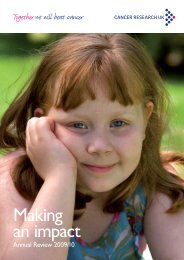Annual Review 2008/09 - Cancer Research UK
Annual Review 2008/09 - Cancer Research UK
Annual Review 2008/09 - Cancer Research UK
You also want an ePaper? Increase the reach of your titles
YUMPU automatically turns print PDFs into web optimized ePapers that Google loves.
Making an impact<strong>Annual</strong> <strong>Review</strong><strong>2008</strong>/<strong>09</strong>
Contents01 Welcome to our review of the year02 Who we are03 Our vision, purpose and goals04 Introducing our fi ve-yearstrategy 20<strong>09</strong>–201405 Progress against our goals06 <strong>Research</strong> highlights for the year08 Focusing on the individual10 Looking to tomorrow12 Information that saves lives14 Infl uencing public policy16 Working together to tackle skin cancer18 Our work around the <strong>UK</strong>20 Fundraising and supporting our work22 Our fi nances24 Our objectives for next year26 The Executive Board27 Thank you29 Find out more and get involved
Welcome to ourreview of the yearThis has been a challenging but successfulyear for <strong>Cancer</strong> <strong>Research</strong> <strong>UK</strong>. We are proudof the impact the Charity is having in the fightagainst cancer.Fundraising successDespite the recession, our fundraising income grew from£419 million to £433 million. This is thanks to the inspirationalefforts of our supporters, volunteers and donors. None ofour work would be possible without their help.Strategy for the futureIn November we launched our five-year strategy, which aimsto reduce the number of people dying from cancer. Thisstrategy will help us decide how we spend our money,what research we fund and how to meet our ten goals.We launched our first <strong>Cancer</strong> <strong>Research</strong> <strong>UK</strong> Centres, whichwill help bring our strategy to life. These centres of researchexcellence will take our world-class research and turn it intobetter treatments for patients. By 31 March 20<strong>09</strong> we hadlaunched Centres in Belfast, Birmingham and Liverpool, andsince the beginning of April 20<strong>09</strong> we’ve approved Centresin Cardiff, Newcastle, Southampton and London. We planto establish up to 11 further Centres by the end of 2010.Early diagnosisEvery year, many thousands of deaths could be avoidedif cancer was diagnosed earlier. That’s why we are makingearlier diagnosis a major focus of our work. Harpal isco-chairing the National Awareness and Early DiagnosisInitiative (NAEDI) with the National <strong>Cancer</strong> Director,Professor Mike Richards. Through it, we are bringingexperts and organisations together to develop and shareways to diagnose cancer earlier, and save lives.<strong>Cancer</strong> <strong>Research</strong> <strong>UK</strong> plays a crucial role in finding new drugsto beat cancer. This year the first two drugs entered our newClinical Development Partnership programme, whichsupports the progress of promising anti-cancer agents thatwould not otherwise be developed. Through our researchover the years we have contributed to the discovery or earlyclinical trials of nearly 50 drugs currently in development– a huge achievement. We fund over 180 clinical trials at anytime, providing direct benefit to more than 20,000 cancerpatients in the <strong>UK</strong> every year. The impact of our work hasbeen tremendous. Our doctors and scientists contributedto 19 of the top 20 drugs currently used to treat people withcancer across the world.Raising our voiceOver the year we worked hard, and successfully, to keepcancer at the top of the political agenda. The <strong>UK</strong> and Scottishgovernments both made major commitments to do moreto reduce smoking – the single biggest cause of cancer inthe world.Your supportWe have been overwhelmed by the continued dedicationof our supporters, who have raised funds, volunteered withus and campaigned on our behalf. By giving us your support,you are helping us to achieve our vision – together we willbeat cancer. Thank you.World-class researchOur research continues to be world-class, with new andexciting developments helping us to understand, prevent,diagnose and treat cancer.During the year, our Beatson Institute for <strong>Cancer</strong> <strong>Research</strong>underwent a very successful review by a team of internationalexperts, and the <strong>Cancer</strong> <strong>Research</strong> <strong>UK</strong>-MRC Gray Institute forRadiation Oncology and Biology became fully operational.David NewbiggingChairman28 July 20<strong>09</strong>Harpal S KumarChief Executive Officer28 July 20<strong>09</strong><strong>Annual</strong> <strong>Review</strong> / Welcome to our review of the year / 01
Who we areWe are the world’s leading charity dedicatedto beating cancer through research. Ourgroundbreaking work has saved millions of lives.Around 300,000 people are diagnosed with cancer in the<strong>UK</strong> every year. Every two minutes someone is told they havecancer. And every year more than 150,000 people die fromthe disease. It is difficult to overstate the human tragedycaused by cancer.In February 2002 The <strong>Cancer</strong> <strong>Research</strong> Campaign and theImperial <strong>Cancer</strong> <strong>Research</strong> Fund merged to create <strong>Cancer</strong><strong>Research</strong> <strong>UK</strong>. This marked the beginning of an exciting newchapter of cancer research in the <strong>UK</strong>.Our aim is simple – to reduce the number of people dyingfrom cancer. We’ve already made huge progress, not only inimproving survival, but also in preventing many thousands ofnew cases of the disease. The overall cancer death rate hasfallen by ten per cent in the past ten years (1998–2007), andcancer survival rates have doubled in the last thirty years.But for every person who survives cancer, another does not.The groundbreaking work of our world-class scientists,doctors and nurses across the <strong>UK</strong> is funded entirely by thepublic. The term ‘cancer’ actually describes more than 200diseases that all involve the uncontrolled, abnormal growthof cells. Our work is hugely varied as our knowledge is atdifferent stages for the different diseases. But in almost everytype of cancer, we fund more research in the <strong>UK</strong> than anyother funder. Also, as judged through independent andinternational experts, our work is of the very highest qualityand makes an enormous impact worldwide.We only fund the very best work – three of our scientistshave been awarded the Nobel Prize for their pioneeringdiscoveries. Much of our work is based in the laboratory,where our scientists are building an ever-growingunderstanding of cancer. Everything we learn in thelaboratory helps us to find new treatments and ways toprevent cancer.Our crucial work is behind many important drugs, suchas tamoxifen and herceptin, which have saved the lives ofthousands of women with breast cancer. We discoveredtemozolomide, which is used worldwide to treat peoplewith the most common type of brain tumour. We alsodiscovered carboplatin, one of the most successful cancerdrugs ever developed. Carboplatin is used to treat patientswith ovarian, head, neck, and lung cancer as well as manychildren with cancer.We lobby the Government and run high-profile healthawareness campaigns. Along with thousands of supporters,in 2006 we successfully campaigned for smokefree legislationacross the <strong>UK</strong>. And we provide clear information to helppeople understand more about cancer and the steps everyonecan take to reduce their risk of developing the disease.Our work has helped transform the way cancer is prevented,diagnosed and treated today and we are proud of theimpact we are having against this devastating disease. Wewill continue our work to bring hope to people who areaffected by cancer and save many more lives in the future.‘<strong>Cancer</strong> <strong>Research</strong> <strong>UK</strong> works with consultants,doctors and nurses across the <strong>UK</strong>, includingthe surgeon who performed my lifesavingoperation for prostate cancer. I took partin one of <strong>Cancer</strong> <strong>Research</strong> <strong>UK</strong>’s clinical trials,so that I could be part of their work.’Tim BurgessPapworth, Cambridgeshire02 / <strong>Annual</strong> <strong>Review</strong> / Who we are
Our vision,purpose and goalsOur vision of beating cancer is an enormous challenge.These four purpose statements set out how we are meetingthe challenge— We carry out world-class research to improve ourunderstanding of cancer and fi nd out how to prevent,diagnose and treat different kinds of cancer.— We ensure that our fi ndings are used to improve thelives of all cancer patients.— We help people to understand cancer, the progresswe are making and the choices each person can make.— We work in partnership with others to achieve thegreatest impact in the global fi ght against cancer.Our goalsIn May 2007 we launched ten goals that will shape our workover the next decade and beyond. To achieve these goals, wework in partnership with other charities and medical researchorganisations, as well as professional and public health bodies,pharmaceutical companies, politicians and our supporters –their dedication is essential to our progress.We are working with our partners to achieve the followinggoals by 2020:— People will know how to reduce their risk of cancerThree-quarters of the <strong>UK</strong> public will be aware of the mainlifestyle choices they can make to reduce their risk of gettingcancer.— The number of smokers will fall dramaticallyFour million fewer adults will be smokers, preventingthousands of new cases of cancer every year.— People under 75 will be less likely to get cancerThe chances of a person developing cancer up to the ageof 75 will fall from more than one in four to one in fi ve.— <strong>Cancer</strong> will be diagnosed earlierTwo-thirds of all cancer cases will be diagnosed at a stagewhen the cancer can be successfully treated.— We will understand how cancer starts and developsWe will have a detailed understanding of the causes andchanges in the body in two-thirds of all cases of cancer.— There will be better treatments with fewer side effectsTreatments that accurately target the cancer and havefew serious side effects will be available for at least half ofall patients.— More people will survive cancerSurvival rates for all common cancers will increase, withmore than two-thirds of newly-diagnosed patients living forat least fi ve years.— We will especially tackle cancer in low incomecommunitiesThe differences in the risk of dying from cancer between themost affl uent and the least affl uent will be reduced by half.— People with cancer will get the information they needAt least nine out of ten patients will be able to access theinformation they need at the time of diagnosis and duringtreatment.— We will continue to fi ght cancer beyond 2020Suffi cient scientists, doctors, nurses and infrastructure willbe in place to ensure continued rapid progress in the fi ghtagainst cancer beyond 2020.<strong>Annual</strong> <strong>Review</strong> / Our vision, purpose and goals / 03
Introducing our five-yearstrategy 20<strong>09</strong>–2014Thanks to our work, more people are beatingcancer than ever before. Our aim is to reducethe number of deaths from cancer. Our futureplans are ambitious, but they are in line withthe challenge and the responsibility we face.In November <strong>2008</strong>, we launched our strategy for the next fiveyears, aimed at further reducing deaths from cancer. Our visionand goals helped shape the strategy, which will guide ourdecisions, the investments we make and the work we fund.We hope it will inspire people to understand the impactwe are making and continue to fund our lifesaving work.Over the next five years, we plan to spend around£300 million each year to beat cancer. We will continueto fund world-class research to advance our understandingof cancer, improve prevention and screening, diagnose cancerearlier and develop better treatments. We will provide clear,reliable information to help people make informed decisionsthat will reduce their risk of cancer and increase the chanceof having their cancer diagnosed earlier. Our information willhelp people with cancer to understand what options areavailable to them and to make decisions about the besttreatment. We will also continue to use our influence withthe governments of the <strong>UK</strong> to help us achieve our goals.We will focus our work on the areas that will have thegreatest impact on reducing cancer deaths. We want to buildon our current strengths in basic science, drug discovery anddevelopment, population studies and clinical research. We willdo more in key areas such as prevention, early detection andimaging. We will boost research in key areas such as surgeryand radiotherapy, and into cancers where survival is still low,such as oesophageal, lung and pancreatic cancers.Although we have launched a five-year strategy, our goalsrepresent longer-term ambitions. So, as part of this plan, wewill invest to continue our progress, not only over the nextfive years, but also into the future.We believe this new strategy will take us closer to achievingour vision – together we will beat cancer.To download a PDF of our five-year strategy go towww.cancerresearchuk.org/our-strategy-20<strong>09</strong>-2014‘I was diagnosed with breast cancer in 2002and I’ll never forget the awful day when I wastold I had cancer. I’ve had surgery, radiotherapyand chemotherapy but thanks to the workof <strong>Cancer</strong> <strong>Research</strong> <strong>UK</strong>, a cancer diagnosisdoesn’t have to be a death sentence.I’m living proof of that.’Audrey WilliamsStreatham, London04 / <strong>Annual</strong> <strong>Review</strong> / Introducing our five-year strategy 20<strong>09</strong>–2014
Progress againstour goalsWe introduced our ten goals for 2020 earlierin this review. Each year, we will report on thefirst three goals. We will monitor the othergoals every three years and will report onour progress on all our goals, with the first fullreport in 2010.Our progress so farPeople will know how to reduce their risk of cancer— Three-quarters of the <strong>UK</strong> public will be aware of themain lifestyle choices they can make to reduce their riskof getting cancerWe saw a small increase during 2007 from 23% to 31% ofpeople able to name, without being prompted, three ormore lifestyle-related risks of getting cancer. This level ofawareness was unchanged in <strong>2008</strong> at 31%. Progress hasbeen slow, and the challenge is to make more substantialadvances in this area. But these figures were collected beforethe introduction of the Department of Health’s Change4Lifeinitiative. This could make a big impact on awareness, byhelping people to know some of the causes of cancer, suchas obesity, so they can take steps to reduce their chancesof developing the disease.The number of smokers will fall dramatically— Four million fewer adults will be smokers, preventingthousands of new cases of cancer every yearWe are on track to meet this goal. <strong>Cancer</strong> <strong>Research</strong> <strong>UK</strong>experts predict that lung cancer death rates will drop bynearly one-fifth over the next 20 years as a direct resultof fewer people smoking.Successful measures to tackle smoking, such as thetobacco advertising ban and the legislation making publicplaces smokefree, have meant the number of smokers hascontinued to fall this year. The latest figures show that thenumber of smokers in the <strong>UK</strong> fell by around 1.3 millionbetween 2005 and 2007.People under 75 will be less likely to get cancer— The chances of a person developing cancer up to the ageof 75 will fall from more than one in four to one in fiveThis remains one of our most challenging goals. The overallrisk of developing cancer up to the age of 75 is still at aroundone in four.Although the chance of developing some cancers, particularlysmoking-related cancers, is falling, others are becomingmore common. Over-exposure to the sun and use ofsunbeds has led to increased rates of the most serious formof skin cancer, malignant melanoma. Also, prostate cancerrates are increasing, largely due to more widespread testing.This may lead to unnecessary treatment for some men withslow-growing tumours.For more information on our goals and how we are workingto meet them, visitwww.cancerresearchuk.org/ourgoalsThe death rates for threeof the <strong>UK</strong>’s most commoncancers, breast, bowel andmale lung cancer, havedropped to their lowestlevels for almost 40 yearsHalf of all long-term smokerswill die from their addiction.It’s vital that we continueworking to reduce the impactthat tobacco has on thelives of so many people<strong>Annual</strong> <strong>Review</strong> / Progress against our goals / 05
<strong>Research</strong> highlights for the yearOur world-class researchThis year has seen some fantastic progressin the understanding, prevention, diagnosisand treatment of cancer. Here are just a fewof the many achievements of our scientists,doctors and nurses.Computers to boost breast cancer detectionUsing a new way of interpreting breast X-rays, our scientistsdiscovered that a single trained expert plus a computer is justas effective as two experts at detecting breast cancer. Forcountries that rely on single ‘readers’, using a computer toowill make breast screening programmes even more effectiveand accurate. And in the <strong>UK</strong>, where two radiologists are usedto interpret results, this new approach would allow the samenumber of experts to read more mammograms in a givenperiod of time, freeing up valuable time for radiologists tocarry out more screening.Bowel screening set to save livesOur scientists predict that bowel cancer screening willsave over 2,500 lives every year in the <strong>UK</strong> by 2025. Hometesting is currently being rolled out across England, Scotland,Northern Ireland and Wales. The simple test detectsnon-visible blood in the stool, which can be an early signof bowel cancer. We know that when cancer is diagnosedearlier, the treatment is more likely to be successful.Breakthrough in understanding a common childhood cancerOur scientists pinpointed the first genetic link to the mostcommon type of brain tumour in 5 to 19 year-olds. Thisresearch provides a crucial lead to help doctors diagnose thedisease more accurately and treat it more effectively.Towards effective cancer vaccinesOur researchers located a key molecule that could be usedto direct the body’s immune system to attack cancer cells.By investigating specific parts of the immune system, called‘dendritic cells’, they pinpointed an important protein ‘tag’.<strong>Research</strong>ers now hope to build on this exciting discovery anddevelop a vaccine that homes in on the tag, so that a patient’sown immune system can be activated to seek out anddestroy cancer cells.On the pathway to new treatmentsBy studying tumour cells in the laboratory, our scientistsdiscovered a promising new approach to beating cancer.Drugs that block a specific protein are already being testedin clinical trials. These drugs work by stopping cancer-causingprocesses in the cell that are controlled by the protein.Our researchers also studied other proteins that ‘team up’with it and discovered that blocking their activity could alsoeffectively kill-off tumour cells. This work opens up excitingopportunities for the drug discoveries of tomorrow.06 / <strong>Annual</strong> <strong>Review</strong> / <strong>Research</strong> highlights for the year
‘I investigate how theimmune system detects andresponds to infection. Thiswork could help us developnew treatments, using thepatient’s own immunesystem to fight their cancer’Caetano Reis e SousaLondon <strong>Research</strong> Institute<strong>Annual</strong> <strong>Review</strong> / <strong>Research</strong> highlights for the year / 07
More women than everbefore are surviving breastcancer thanks to our work08 / <strong>Annual</strong> <strong>Review</strong> / Focusing on the individual
Focusing on the individualOur world-class researchProfessor PeterJohnsonChief Clinician,<strong>Cancer</strong> <strong>Research</strong> <strong>UK</strong>We’re increasingly using our improvedunderstanding of cancer biology to developmore tailored approaches to tackle the disease.The past couple of decades have seen anexplosion in our knowledge of cancer, movingus towards an era of personalised treatment.This is enabling us to maximise the benefitsof treatment and reduce the unpleasant sideeffects that people often experience.Death rates from breast cancer in womenare at their lowest in almost 40 years, withfewer than 12,000 women dying from it eachyear. Looking forward, we believe that we cando even more, and better tailored treatmentand disease prevention will drive this process.Using our work in breast cancer as an example,here are some of our recent advances in thefield of personalised treatment.Genetic testsWomen who inherit faulty BRCA genes have a high risk ofdeveloping breast cancer, but these faults are rare. Ourscientists have identified several common gene variants thatmoderately increase a woman’s risk. Recently they showedthat it could soon be possible to offer women a genetic testfor some of these ‘modest risk’ genes. In future, this will allowdoctors to offer cancer prevention or early diagnosis adviceto those at increased risk. Although we’re not quite there yet,this work highlights the potential of a new wave of genetictests to help assess a person’s risk of developing cancer moreaccurately and to tailor prevention and treatment.Tailored drugsThere is great interest within the cancer research communityabout new experimental drugs called PARP inhibitors, whichare being trialled alone or in combination with standardchemotherapy drugs. They are being investigated as a tailoredtreatment for women who have inherited BRCA gene faultsand have gone on to develop breast or ovarian cancer. Tumourcells with faulty BRCA genes have lost one of two ways theyrepair damaged DNA. PARP inhibitors exploit this by shuttingdown the other way. Because tumour cells can’t then repairDNA damage, they die, leaving healthy cells unharmed.Early clinical trials on these new treatments are encouraging,both for inherited cancer and for other cancer types whichalso have faulty DNA repair. We hope to see these drugs fulfiltheir tremendous potential over the coming years.Understanding responses to treatmentEven the most effective cancer drug has varying success indifferent patients. Our scientists are working to understandwhy. In Cambridge, we made a major breakthrough this year indiscovering why some women develop resistance to the drugtamoxifen. This work will help doctors explore new ways toovercome the problem, helping to save many more lives.Our researchers in London found that some early side effectsfrom certain hormone drugs, like tamoxifen, can indicate howlikely it is that a woman’s breast cancer will return. This couldhelp doctors to better target future treatment, based onwhether women experience these symptoms.And our scientists at the University of Edinburgh discoveredthat a test already used to diagnose some cases of breastcancer could also predict who will benefit from drugs calledanthracyclines. Because the test is already available, it couldsoon be used to improve the treatment of many womenwith breast cancer.Continuing work to beat cancerOur progress is hugely encouraging. <strong>Cancer</strong> <strong>Research</strong> <strong>UK</strong>is exceptionally well-placed to apply our understandingof different cancers to move away from ‘one-size-fits-all’treatments. We are increasingly tackling the disease accordingto the profile of the individual patient, and the era ofpersonalised medicine is finally dawning.<strong>Annual</strong> <strong>Review</strong> / Focusing on the individual / <strong>09</strong>
Looking to tomorrowOur world-class researchThe past year has seen some promising earlytrial results and the start of many exciting newresearch projects that we hope will lead tothe big breakthroughs of tomorrow.Lung cancer screeningAround 95 people die from lung cancer every day in the <strong>UK</strong>.We know that the earlier the disease is diagnosed, the morelikely it is that a person will survive their cancer. But currently,more than two-thirds of cases in the <strong>UK</strong> are diagnosed at alate stage.We are investigating two new tests for lung cancer in peoplewho are at greatest risk of developing the disease. This couldbe the first step towards a nationwide screening programmethat could save tens of thousands of lives.Seeing the brain betterGlioblastoma is the most common type of brain tumour.Patients are usually treated with surgery, radiotherapy andchemotherapy. Despite the introduction of temozolomide,which was discovered by our scientists and is now recognisedas part of the ‘gold standard’ of care, the disease remainsdifficult to treat in the long term.Our scientists are using the latest and most advanced imagingmethods to see how tumours respond to treatment overtime. They hope to collect information from brain imagesto identify characteristics – or ‘biomarkers’ – that predictregions of the tumour that may return after treatment.This could shape future treatment and improve survivalfor people with this type of cancer.Improving recovery after bowel cancer surgeryAround eight out of ten people with bowel cancer undergosurgery at some point. <strong>Research</strong> has shown that keyholesurgery, in which surgeons make a smaller incision to getinside the body, is as good as conventional surgery fortreating bowel cancer.Our scientists are leading a study to find out whetherkeyhole surgery helps people recover sooner and withfewer complications, such as infection. They are comparingkeyhole and conventional surgery alongside an ‘enhancedrecovery programme’, which they hope will help peoplerecover more quickly.Detecting ovarian cancer earlyOvarian cancer has often spread by the time it is diagnosedand it kills around 4,300 women each year in the <strong>UK</strong>. Aswith most cancers, early detection gives the best chanceof survival. But the disease is difficult to diagnose as thesymptoms can be vague and similar to those of many othermore common conditions.<strong>Cancer</strong> <strong>Research</strong> <strong>UK</strong> is helping to fund a major study oftwo ovarian cancer screening tests to see whether theycould save lives in the future. Initial results are encouraging,suggesting that screening can help detect ovarian cancer early.We await further results from this landmark trial – the largestof its kind – to see whether these tests can form the basis ofa national screening programme.For more on our researchwww.cancerresearchuk.org/cancerandresearch10 / <strong>Annual</strong> <strong>Review</strong> / Looking to tomorrow
‘My research on howcells repair DNA damagecould provide leads fornew ways to preventand treat cancer’Simon BoultonLondon <strong>Research</strong> Institute<strong>Annual</strong> <strong>Review</strong> / Looking to tomorrow / 11
Information thatsaves livesWe help people to make informed choicesso that they can reduce their risk of cancer,increase their chances of early detection,understand their cancer, and make informeddecisions about treatment.Our information services give people clear,high-quality information, in the way they want it.High-quality informationOn our award-winning cancer information website<strong>Cancer</strong>Help <strong>UK</strong>, around 2.3 million pages were viewedeach month. And trial summaries on our unique clinical trialsdatabase were viewed around 76,000 times each month.In <strong>2008</strong> we launched an online forum, <strong>Cancer</strong> Chat, wherepeople can talk to others affected by cancer.In May <strong>2008</strong> we launched our Science Update Blog todebunk cancer myths and report on the latest developmentsin cancer research globally. The blog has been hugely popularand recently won an Association of Medical <strong>Research</strong>Charities science communication award for best onlineresearch information.Information prescriptionsWe are working with Macmillan <strong>Cancer</strong> Support, theNational <strong>Cancer</strong> Action Team and NHS Choices to developpersonalised information prescriptions within the NHS.We hope that this will improve the way doctors and nursesgive information to patients.Early diagnosisWe know that many thousands of cancer deaths could beavoided each year in the <strong>UK</strong>, if cancers were diagnosed earlier.NAEDI’s aim is to coordinate and provide support toactivities that promote the earlier diagnosis of cancer. It aimsto understand the reasons behind delays in diagnosis, toestablish the best ways to encourage the public to recognisethe warning signs and go promptly to their doctor, and tounderstand the links between early diagnosis and survival.Spotting cancer early can mean that treatment is simplerand more likely to be effective. We have launched four shortfilms aimed at making people aware of the importance ofrecognising the early signs and symptoms of cancer.Prevention and campaignsAround half of all cancers could be prevented by changesin lifestyle.In partnership with the British Heart Foundation andDiabetes <strong>UK</strong>, as part of the Department of Health’sChange4Life campaign, we ran a short series of advertsabout the possible effects of children eating unhealthy dietsand being inactive. After seeing the campaign, one third ofmums say they have encouraged their children to snack lessoften and do more physical activity.Our three <strong>Cancer</strong> Awareness Roadshows travelled aroundthe country to take our healthy living messages direct to localcommunities where knowledge about cancer prevention islow. Of 7,000 visitors surveyed, 85% intended to change theirlifestyle following their visit to the Roadshow. These lifestylechanges could have a real impact on reducing their risk ofdeveloping cancer.For information about cancerwww.cancerhelp.org.ukWe are playing a central role in the National Awarenessand Early Diagnosis Initiative (NAEDI). Harpal Kumar, ourChief Executive, is co-leading the initiative with ProfessorMike Richards, the National <strong>Cancer</strong> Director.12 / <strong>Annual</strong> <strong>Review</strong> / Information that saves lives
Last year, our specialistcancer information nursesanswered nearly 10,000queries, giving clear,confidential informationabout cancerOur <strong>Cancer</strong>Stats websitecontinues to be a leadingsource of statistics inthe <strong>UK</strong>, giving data on thenumbers of cases, deathsand survival for 26 of themost common cancers<strong>Annual</strong> <strong>Review</strong> / Information that saves lives / 13
Influencing public policyWe work with politicians around the <strong>UK</strong>to keep cancer at the top of the politicalagenda. We take every opportunity to meetwith Ministers, politicians of all parties andcivil servants. We tell them what we thinkabout important issues relating to cancerand how legislation could be changed forthe better. It’s an essential part of our workto help us beat cancer.Our ‘Out of Sight, Out of Mind’ campaign urges politicians toprotect children and young people from tobacco marketing,aiming to stop them from becoming smokers in the firstplace. We have lobbied in Westminster and Scotland,supporting proposals to put tobacco out of sight in shopsand supermarkets. We have also been calling for tobaccovending machines to be removed and cigarettes to becovered by plain packaging.Many thousands of you joined our campaign, signing petitionsand emailing your views to Peers, MPs and MSPs. As a result,the Westminster and Scottish parliaments are debating newlaws to remove tobacco products from the point of sale andrestrict vending machines.Our ‘Screening Matters’ campaign, to get more people toattend cancer screening programmes, continues to have animpact. We produced a set of detailed policy reports forNHS organisations. These looked at ways to increase theuptake of screening and make sure there are enough trainedstaff in the screening services. These reports were based oninformation collected by our supporters from local MPs andNHS bodies. We are now working to build stronger links withthe NHS at a local level to help them implement nationalguidance on cancer.Access to new cancer drugs continues to make headlinesand cause controversy. We were an integral part of the changewhich means treatments for rarer cancers are now more likelyto be approved. We also asked cancer patients to commenton a series of important decisions by the National Institute forHealth and Clinical Excellence (NICE) on whether to allow theuse of four new kidney cancer drugs in the NHS. We sharedthese views with NICE’s specialists, as well as telling them whatour researchers and clinicians thought of their decisions.We continue to work with the national parliaments andassemblies to help them develop, introduce and monitortheir national cancer plans. These strategies will help shapecancer services and aim to improve cancer prevention,diagnosis, treatment and research. We make sure the voicesof patients and researchers are heard on crucial cancer issues.For more on our influencing workwww.cancerresearchuk.org/publicpolicy14 / <strong>Annual</strong> <strong>Review</strong> / Influencing public policy
This year, we’ve seen realchange for patients, carersand researchers across areasranging from screening toaccess to new cancer drugsNone of this progress wouldbe possible without thesupport of our scientistsand our millions of donorsand volunteers<strong>Annual</strong> <strong>Review</strong> / Influencing public policy / 15
Working togetherto tackle skin cancer<strong>Research</strong>, information and influencing public policySarah LynessExecutive Director,Communicationsand InformationWe know how good it feels to be outside,enjoying the sunshine. People tell us they feelbetter when they have a suntan. And we knowthat sunlight is important for making enoughvitamin D. But spending too much time in thesun, or using sunbeds, can increase your riskof skin cancer. Skin cancer is one of the mostcommon cancers in the <strong>UK</strong> and more than2,600 people die from it each year in the <strong>UK</strong>.There are two main types of skin cancer. Non-melanoma skincancer is very common. Each year more than 81,000 cases ofnon-melanoma skin cancer are diagnosed in the <strong>UK</strong>, but almostall are treated successfully by local surgery. Melanoma is lesscommon but much more serious. The vast majority of deathsfrom skin cancer are from melanoma. More than 10,400people in the <strong>UK</strong> are diagnosed with melanoma each year.Survival rates for melanoma have been improving over thepast 25 years and are now among the highest for any cancer.This is thanks to a combination of improved awareness, earlydetection and better treatment.But there is still much to do. Over the last 25 years, thenumber of people developing melanoma in Britain has risenfaster than for any other common cancer. Experts believethat our love of sunbathing and our use of sunbeds arecontributing to these rising rates. So we will continue to workhard to beat this disease.Our researchLearning more about how skin cancer develops helpsresearchers design new ways to prevent and treat this disease.Our researchers are investigating how faults in specific genes,along with lifestyle factors, influence the risk of developingmelanoma. Understanding these lifestyle factors helps us giveclear advice on skin cancer prevention. We already know thatmost skin cancers are caused by overexposure to ultraviolet(UV) light from the sun or sunbeds.UV light affects our DNA and can lead to the developmentof faults in specific genes. In 2002, <strong>Cancer</strong> <strong>Research</strong> <strong>UK</strong>fundedscientists at the Institute of <strong>Cancer</strong> <strong>Research</strong> helpeddiscover that faults in a gene called BRAF occur in aboutseven out of ten melanomas. This year they discovered thatthese faults are a crucial first step in the development ofmany skin cancers. The work has led to the rapid discoveryof inhibitors of BRAF as a potential treatment for melanoma.We know that people with many moles are at increased riskof melanoma. Our researchers recently pinpointed twogenetic variants that make people more likely to developmoles. The same variants were also linked with an increasedrisk of melanoma. This important discovery could helpresearchers better understand how melanoma developsand ultimately lead to new treatments.Getting too much UV radiation can cause skin cancer, butsmall doses of UV are important for making vitamin D. Thisnutrient helps to maintain healthy bones and it could help toreduce the risk of bowel cancer. Our researchers are studyinghow much sun exposure people in the <strong>UK</strong> need in order tohave enough vitamin D all year around, so that public healthmessages around sun protection can balance the need forvitamin D against the risks of skin cancer.Our informationBecause the majority of cases of skin cancer are preventable,we run SunSmart – the <strong>UK</strong>’s national skin cancer awarenesscampaign – to educate people about skin cancer and sunprotection. SunSmart provides resources, information andadvice on skin cancer prevention and early detection to thepublic, health professionals, cancer networks and localauthorities. As part of our focus on young people, this year wecommissioned research to identify attitudes and reasons forwanting a tan and using sunbeds in 12 to 24 year-olds. Thisresearch informed our activities targeted at young people. Werecently updated the SunSmart website so that we can talkmore effectively with younger people and sunbed users. Thenew site received around 14,000 visitors each month in <strong>2008</strong>.We also use the insights of researchers at the Health Behaviour<strong>Research</strong> Centre, University College London, to developinitiatives for SunSmart. We know that changing behaviouris a key part of reducing the risk of getting skin cancer.Our influencing and lobbying workWe work extensively with politicians to raise awareness ofskin cancer. As part of this work, we’ve lobbied for regulationof sunbed salons across the <strong>UK</strong>. In summer <strong>2008</strong> the ScottishGovernment agreed to legislate to better regulate sunbedsalons in Scotland.This year’s annual Molewatch clinic in Westminster was hugelysuccessful. Over 60 MPs came along to find out more aboutprevention and signs of skin cancer, including having any moleschecked. Many went on to promote our health messages totheir constituents.By bringing together our work in research, informationcampaigns and lobbying for improved public policies, wecan have the greatest impact in the fight against skin cancer.
Last year, we spentnearly £13m on researchinto skin cancerProtecting yourself fromtoo much UV will reducethe risk of getting skin cancer<strong>Annual</strong> <strong>Review</strong> / Working together to tackle skin cancer / 17
InvernessAberdeenDundeeSt AndrewsStirlingGlasgow Edinburgh(Beatson Institute)Derry / LondonderryAyrDumfriesNewcastle upon TyneAntrimCarlisleSunderlandCraigavonBelfastBarrow-in-FurnessWhitehavenPrestonMiddlesbroughNorthallertonLeedsYorkBradfordHuddersfieldKingston-upon-HullBangorLiverpool Manchester Sheffield(Paterson Institute)ChesterLincolnWrexhamStoke-on-TrentBirminghamNottinghamLeicesterBostonKing’s LynnNorwich<strong>Research</strong> InstitutesOur fi ve core-fundedresearch Institutes.Funding hubs for our researchLocations where we spent over£1 million on research in thelast year.TruroAberystwythCoventryIpswichWarwickCambridgeMilton KeynesHereford(Cambridge <strong>Research</strong> Institute)SwanseaBristolSwindonOxford(Gray Institute)ChelmsfordCardiffLondonBath Reading (London <strong>Research</strong> Institute)GuildfordTauntonMaidstoneSouthamptonYeovilBrightonExeterOther locations where wefund research and supportclinical trialsJust some of the locations wherewe fund research and supportclinical trials across the <strong>UK</strong>.<strong>Annual</strong> <strong>Review</strong> / Our work around the <strong>UK</strong> / 19
Fundraising andsupporting our workOur work is entirely funded by the public.None of it would be possible without thegenerosity and commitment of the millionsof people that support us. Here are just someof the ways they do it.DonationsOur supporters can set up a regular donation by DirectDebit, donate online or give through their payroll. Somechoose to give in celebration of a special event like awedding, anniversary or birthday, or in memory of a lovedone. Or they donate to a specific project that they areinterested in.Race for LifeOur flagship women-only event has gone from strength tostrength. In <strong>2008</strong>, around 686,000 women came together at262 Race for Life events around the country, to walk, jog orrun the 5k course. As well as the participants and the peoplethat sponsor them, we would like to thank the thousands ofvolunteers who give up their time to make Race for Life, andmany of our other events, possible.LegaciesMany people choose to remember someone or to continuetheir support for us by making a gift in their Will. Last year, thisraised an amazing £157 million towards our work.Local groups and committeesAcross the <strong>UK</strong>, people get involved by joining or forming localgroups and committees. Their activities range from producingcharity calendars to the design and building of award-winningRHS show gardens.Our shopsWe have 579 shops around the <strong>UK</strong>, selling donated itemsand some brand new goods. To make sure we have enoughhigh-quality stock, we have introduced Donation Stationswhere people can drop off their unwanted goods. And tomake shopping even easier, we have launched our very ownonline shopping site www.shoptobeatcancer.org.ukDaytime TV presenter Lorraine Kelly presented a certificateto staff and volunteers in our shop in Blairgowrie, Scotland, inrecognition of the incredible £1.5 million the shop has raisedsince it opened in 1992.Relay For LifeRelay For Life is our overnight community-based event thatcelebrates the lives of those touched by cancer. More andmore people are getting involved and a record 91 Relayswere held last year.In partnership with businessOur partners include large and small companies, and we workwith them in many different ways. Staff can get together tofundraise or volunteer for us, or the company may promoteone of our events to their staff and customers. Importantly,more and more of our business partners want us to helpthem provide health information to their employees.Volunteering47,500 people regularly volunteer for us. People bring theirskills, time and experience to help us in our work. You couldtry our internship scheme, work in a shop, or help out at oneof our events.20 / <strong>Annual</strong> <strong>Review</strong> / Fundraising and supporting our work
Celebrities play an invaluable role when itcomes to supporting and promoting ourwork. Here are just some of the events theytook part in.Sound and VisionRadio and TV presenters Bob Harris and Dermot O’Learyhosted the fourth Sound and Vision at Abbey Road Studios.Musicians Paul Weller, Kelly Jones and Lemar played intimatesets to an audience of 400, and the event was broadcast byAbsolute Radio. We are also grateful to our Founding Patron,Sir George Martin, and the range of sponsors and partnersincluding Charity of the Year Partners Sony Music andLive Nation.Flora London MarathonOver 1,500 runners pulled on their trainers for <strong>Cancer</strong><strong>Research</strong> <strong>UK</strong> to run the Marathon in April <strong>2008</strong>, raising anamazing £1.5 million. Among those running for us were singerRonan Keating, singer and actress Kelle Bryan, actress PhoebeThomas and actor Andy Newton-Lee.Ethnic Minority <strong>Cancer</strong> Awareness WeekThis is a new initiative from a collaboration of charities toraise awareness among ethnic minority groups. The weekbegan with a parliamentary reception launched bynewsreader Sir Trevor McDonald.Thank you to everyone who supportsus and helps us continue our vital work.For more information on ways to support us, please visitwww.cancerresearchuk.org/supportus‘I know that for many women, Race for Lifeholds a special place in their hearts, and thedetermination and passion that is feltthroughout the events creates an atmospherethat is truly special and inspiring for us all.’Gloria Hunniford, Patron of Race for Life<strong>Annual</strong> <strong>Review</strong> / Fundraising and supporting our work / 21
Our financesWhat you raised and what we spent it onDespite the global recession, our fundraising income went upthis year as donors continued to show their inspiring supportfor our work. Our funds raised grew to £433 million from£419 million in the previous year. Our total income grew by£23 million to £498 million.Because of the way we account for our research grants, weaccount for the money when we make the awards, ratherthan when the researchers use the money. In terms of actualresearch activity, what we spent on research increased from£338 million in 2007/08, to £355 million in <strong>2008</strong>/<strong>09</strong>.As a result of the economic uncertainty, we have beencautious about where we have been spending money,without compromising our research objectives. We havemet all our existing research grant awards and have spent£303 million on research.We also spent £15 million on our cancer information andadvocacy work. This shows our commitment to providingbetter cancer information to everyone affected by cancer,and to lobbying governments to make sure we have thebest public policies.How you raised £433 million£157mLegaciesPeople leaving usa gift in their Will£64mShop incomeSales from donated goodsand our own products£25mVolunteer fundraisingCommunity fundraising– local events and appeals,including Relay For Life£18mOther incomeIncluding major gifts,corporate partnershipsand shop donations£77mEventsNational events such asRace for Life, Run 10kand activities for theBobby Moore Fund£92mDirect givingRegular and one-off donations,payroll giving, and online products22 / <strong>Annual</strong> <strong>Review</strong> / Our finances
For every pound we receive, excluding retail,80 pence is available to spend on our workto beat cancer.Last year we spent over £9 million onresearch into children’s cancer. We are thelargest single funder of research into children’scancer in the <strong>UK</strong>.Total cost of research workdone during the year – £355 million* In basic research, our scientists are working in laboratoriesto understand exactly how cells normally work, so that theycan find out what goes wrong in cancer. This research is vital,increasing our understanding of the molecular basis of thedisease and laying the foundations for new ways to detectand treat many different types of cancer.£38.7mIncludes cervical, kidney,stomach, sarcoma,testicular, pharyngealand over 100 other cancers£44.6mBreast£5.5mBrain£6.9mPancreatic£7.1mBladder£8.8mNon-Hodgkin’sLymphoma£142.9mBasic research *£29.8mBowel£12.2mOvarian£12.7mLung£12.9mSkin£13.6mLeukaemia£19.4mProstate<strong>Annual</strong> <strong>Review</strong> / Our finances / 23
Our objectivesfor next yearHere are just some of the objectives we willbe working towards over the coming year.Launch further <strong>Cancer</strong> <strong>Research</strong> <strong>UK</strong> Centres during 2010The Centres are designed to create the best possibleenvironment for research, that will translate into improvedoutcomes for patients and the general public. Over the nextyear we will launch further Centres and begin to developa <strong>UK</strong> network.Continue progress on the <strong>UK</strong> Centre for Medical <strong>Research</strong>and Innovation (<strong>UK</strong>CMRI)The <strong>UK</strong>CMRI will be a world-class research centre and oneof the largest biomedical research institutes in Europe. It willbring together experts and funding from <strong>Cancer</strong> <strong>Research</strong> <strong>UK</strong>,the Medical <strong>Research</strong> Council, the Wellcome Trust andUniversity College London to discover new insights intocomplex diseases such as cancer, and how they can betreated and prevented. The Centre will be a state-of-the-artfacility, delivering cutting-edge research as well as trainingtomorrow’s scientists.Continue to attract, train and retain the cancer researchworkforce of the futureWe will keep providing funding routes for high-qualityresearchers to get research training at the start of theirresearch careers, to gain post-doctoral research experienceand to develop independent research groups. We will set upTraining Accounts in each of our Centres to support researchtraining for PhD students and clinical research fellows. Wewill also improve the support we give our clinical fellows bysetting up a mentoring scheme and by expanding the scopeof our communication skills training courses.Prepare for the next General ElectionWe will make sure that cancer and science are high onthe agendas of the <strong>UK</strong>’s main political parties in the run-upto the next General Election. Our manifesto will lay outthe pledges we want to see from politicians in health andscience policy. We will continue to campaign to strengthenthe <strong>UK</strong>’s commitment, capacity and delivery in the area oftobacco control.Promote and fund research on cancers that have the poorestsurvival ratesDespite significant progress in cancer diagnosis and treatmentin recent years, there are still areas where we have a long wayto go. These include lung, pancreatic and oesophageal cancers.Next year, we aim to establish lung and pancreatic cancerresearch at the heart of some of our <strong>Cancer</strong> <strong>Research</strong> <strong>UK</strong>Centres. We will also work in partnership to fund an initiativein oesophageal cancer.‘I’m a principal investigator on the EuropeanProspective Investigation into <strong>Cancer</strong> (EPIC)study. EPIC is the largest ever study of the linksbetween diet, lifestyle and health. Our findingshave already shed light on how lifestyle affectspeople’s general health and their risk ofdeveloping cancer. This information helpspeople understand the choices they can maketo reduce their risk of developing the disease.’Kay-Tee Khaw,Cambridge University24 / <strong>Annual</strong> <strong>Review</strong> / Our objectives for next year
<strong>Annual</strong> <strong>Review</strong> / Our objectives for next year / 25
The Executive BoardOur Executive Board plans where weinvest our time, money and expertise.It also proposes our annual budget, whichis then submitted to the Council of Trusteesfor approval.The Executive Directors who were members of theExecutive Board on 28 July 20<strong>09</strong> were:1231/ Harpal Kumar MA MEng MBAChief Executive Officer and Chairman of the Executive BoardHarpal joined <strong>Cancer</strong> <strong>Research</strong> Technology Limited as ChiefExecutive in 2002. In addition to this role, he became ChiefOperating Officer of <strong>Cancer</strong> <strong>Research</strong> <strong>UK</strong> in July 2004,before becoming Chief Executive in April 2007.2/ Lilian Clark PhD MBAExecutive Director, Science Operations and FundingLilian was appointed Executive Director, Science Operationsand Funding, in 2007. Lilian is responsible for much of ourscience funding, ensuring that assessment of applications iscarried out objectively and impartially, and that the researchwe fund is regularly peer reviewed.4 563/ Professor Peter Johnson MA MD FRCPChief ClinicianPeter is Chief Clinician for <strong>Cancer</strong> <strong>Research</strong> <strong>UK</strong>. He hasresponsibility for the strategy and shape of the Charity’sclinical activities, both in clinical research and in the widercontext of cancer prevention, diagnosis and treatment.4/ Professor Sir David Lane FRS FRSEChief ScientistSir David is the Chief Scientist of <strong>Cancer</strong> <strong>Research</strong> <strong>UK</strong>. He isthe Director of the <strong>Cancer</strong> <strong>Research</strong> <strong>UK</strong> Transformation<strong>Research</strong> Group at the University of Dundee and isresponsible for developing our scientific strategy.5/ Christine Lloyd BSc MA ACIS MIPD FRSAExecutive Director, People and Organisational DevelopmentChristine joined <strong>Cancer</strong> <strong>Research</strong> <strong>UK</strong> as Executive Director,People and Organisational Development, in 2005. She hasresponsibility for leadership development, human resourcemanagement and organisational change.6 / Sarah Lyness MAExecutive Director, Communications and InformationSarah joined the Charity in 1997. She developed andlaunched the <strong>Cancer</strong> <strong>Research</strong> <strong>UK</strong> brand in 2002. She isresponsible for providing communications and informationabout cancer and the Charity’s work to external audiences.787/ Lynne Robb BSc ACAChief Financial Officer and Executive Director,Corporate ResourcesLynne joined <strong>Cancer</strong> <strong>Research</strong> <strong>UK</strong> as Finance Director during2002. Her role has expanded to become Chief FinancialOfficer and Executive Director of Corporate 7 Resources,which includes Legal, Property, Finance, Treasury andProcurement for the organisation.8/ Peter Sneddon BSc DPhil (Oxon)Executive Director, Clinical and Translational Operationsand FundingPeter joined the Charity in December <strong>2008</strong> from theDepartment of Health, where he was Head of <strong>Research</strong>Programmes and Deputy Director (<strong>Research</strong> andDevelopment). He is responsible for the operation ofprogrammes within Clinical and Translational <strong>Research</strong>.9/ Richard C TaylorExecutive Director, Fundraising and Supporter MarketingRichard joined the Charity as Retail Director in April 1998.He is responsible for the fundraising strategy which drivesincome to support the Charity’s long-term ambitions.926 / <strong>Annual</strong> <strong>Review</strong> / The Executive Board
Thank youWe are extremely grateful to everyonewho has made our work possible.We would particularly like to thank:All the people that help us in our researchby taking part in clinical trials and helpingin our population studies.We would like to thank our Patron,Her Majesty The Queen, and our JointPresidents, HRH The Duke of Gloucesterand HRH Princess Alexandra, for theirinvaluable support.6,466people whoremembered usin their Wills‘I’m proud to support <strong>Cancer</strong> <strong>Research</strong> <strong>UK</strong>.Thanks to their tireless work, more peopleare beating cancer than ever before.’HRH Princess Alexandra1,088,076regular givers17,000people whovolunteered at ourRace for Life andRun 10k events<strong>Annual</strong> <strong>Review</strong> / Thank you / 27
Thank youWe would also like to thankThe people at our corporatepartnersAEGON <strong>UK</strong>Anglo Irish BankArcadia Group LimitedArtemisAstraZenecaAT&TB&QBaker and McKenzieBeiersdorf <strong>UK</strong> (Nivea)Bowman & DrewBritish AirwaysBusiness PostCullum CapitalVentures LimitedCitiClifford Chance LLPCompass Group <strong>UK</strong>& Ireland PlcComputacenter <strong>UK</strong> LtdDeloitteDiamond Car InsuranceeBay/MissionfishElliott Brothers LtdFlyBeThe Football AssociationGarminGenslerHarlequins Rugby ClubHearst DigitalHighland SpringHSBCJ D Williams & CompanyJ T Ellis & CoLexis PRLive NationLloyds Banking Group PlcLondon MarriottBusiness CouncilM&Co.Mace GroupMan Group PlcNational Grid PlcThe Pampered ChefPeacock’s Stores LimitedPhoenix TradingPremier FoodsThe ProfessionalFootballers’ AssociationThe Royal Bankof Scotland GroupRunners WorldSkandiaSociété GénéraleSony MusicSportsdirect.comStandard & Poor’sStoke Park ClubSuperstars MemorabiliaTescoTK MaxxTowergate PartnershipToyota Motor Manufacturing(<strong>UK</strong>) LtdWembley National StadiumWest Ham UnitedOur major supportersthis yearThe Ada HillardCharitable TrustMiss Agnes H Hunter’s TrustAudrey and Ronnie’s FundRebecca BaronP R BathThe Cecil Rosen FoundationThe Charles andElsie Sykes TrustThe Constance TravisCharitable TrustJohn and Barbara CottonThe D G Charitable TrustDaneway Charitable TrustDr Elizabeth Beryl Daviesand Dr Gareth DaviesThe Denise Leffman TrustCyril Dennis MBESydney DraperEdmond J SafraPhilanthropic FoundationThe Enid Linder FoundationThe Estate of Spenta CamaThe Eveson Charitable TrustTim and Prudence FaithfullThe Foster WoodFoundationFriends Provident FoundationThe Gerald RonsonFoundationThe Gill Gurdit Singh FundMr Jonathan GoldsteinSir Donald GordonThe Gordon W BulmerCharitable TrustMr Bob HarrisThe Harry Bacon FoundationThe James Baldwin TrustJimmy Knapp <strong>Cancer</strong> FundThe Sir John FisherFoundationThe Juliette ProudloveMemorial FundThe Kathleen LaurenceCharitable TrustMr Ronan KeatingRobert and Anna KingLadbrokes Charitable TrustThe Lennox andWyfold FoundationThe Leonora Children’s<strong>Cancer</strong> FundThe Lidbury Charitable TrustMarie Keating FoundationThe McGrathCharitable TrustThe Mike GooleyTrailfinders CharityThe Moffat Charitable TrustStephanie Moore MBEMusgrave Charitable Trust LtdMyfanwy TownsendMelanoma <strong>Research</strong> FundOak FoundationThe Order ofWomen FreemasonsThe Palgrave BrownFoundationThe Pamela WilliamsCharitable TrustThe Parthenon TrustThe Peacock TrustPilkington Charities FundMr and Mrs Nigel PritchardThe Ranworth TrustThe Richard LawesFoundationBrenda RowbottomThe Ryland Thompson TrustSue ScottShareGiftThe Steel Charitable TrustTeam EnglandFootballers’ CharityThe Toby Charitable TrustMr and Mrs Robin TomkinsThe Tony BramallCharitable TrustMrs Humphrey Wood MBEMr John WoodThomas WoodAnd everyone else who hassupported usOur TrusteesDavid Newbigging OBE(Chairman)Dr Melanie G Lee CBE BScDSc (Hon) FMedSci(Deputy Chairman)Professor Colin C BirdCBE FRSEProfessor Sir KennethCalman KCB DL FRSEDr Philip H M Campbell BScMSc PhD DSc FInstP FRASSir James CrosbyLiz A Hewitt FCA BSc(Econ)FRSARoger Matthews ACABSocSciDame Bridget Ogilvie ACDBE FRSDr Keith F Palmer(Treasurer)Leah J Sowden FCA CTADipChAProfessor Jeffrey Tobias MDFRCP FRCR28 / <strong>Annual</strong> <strong>Review</strong> / Thank you
Find out moreand get involvedwww.cancerresearchuk.org– our online homeThe best way to get to know about all ourwork is through our website. It holds a wealthof information, from the research we arefunding and the progress we have made,to ways in which you can support us byvolunteering, raising money or joining oneof our campaigns.It also offers the most up-to-date informationon cancer prevention, screening and earlydetection, and provides details on what weare doing to infl uence government policy.<strong>Cancer</strong>Help <strong>UK</strong>www.cancerhelp.org.uk is our easily accessible andcomprehensive patient information website for anyoneaffected by cancer. It is packed with the most up-to-dateinformation on cancer and cancer care. It also includesour unique clinical trials database, where you can seedetails about clinical trials currently recruiting across the<strong>UK</strong>, as well as results from past trials.<strong>Cancer</strong> Chat<strong>Cancer</strong> Chat is our online discussion forum, where you cantalk to others affected by cancer and share experiences.You can join in the conversations or take a look at whatothers are saying by visiting www.cancerchat.org.uk<strong>Cancer</strong> Information Nurse TeamOur specialist nurses are on hand to talk in confi dence,Monday to Friday, between 9am and 5pm. You can call themon our freephone number 0808 800 4040.Supporter ServicesIf you have any general enquiries, would like to make adonation or tell us how you feel about our work, you cancall our team on 020 7121 6699.Our annual publications are available to download as a PDFat www.cancerresearchuk.org/ourannualpublicationsRegistered charity number 1089464Registered company number 4325234Copyright © 20<strong>09</strong> <strong>Cancer</strong> <strong>Research</strong> <strong>UK</strong>Design: NB StudioPhotography: Nick Turpin<strong>Cancer</strong> <strong>Research</strong> <strong>UK</strong> is committed to upholdingits sustainability policy and achieving the socialand environmental goals outlined within it.Paper 50% recycledCover imageJames McCardle was diagnosedwith testicular cancer in 1996.He was successfully treated andis now married with a young son.
<strong>Cancer</strong> <strong>Research</strong> <strong>UK</strong>Registered address:61 Lincoln’s Inn FieldsLondon WC2A 3PXT +44(0)20 7242 0200www.cancerresearchuk.orgLF013


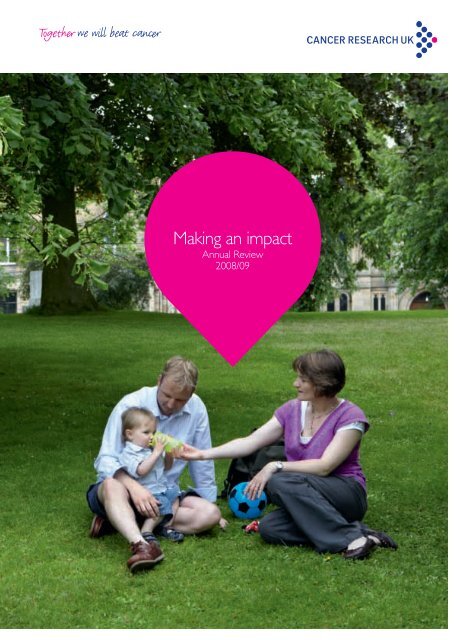
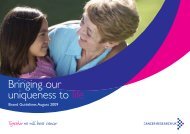
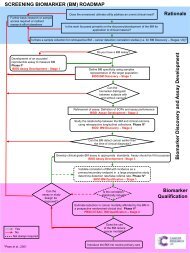
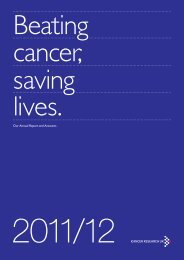
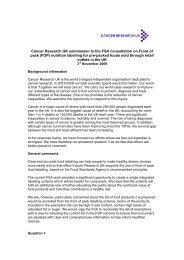
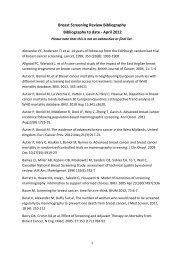
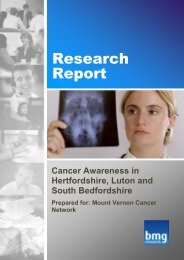
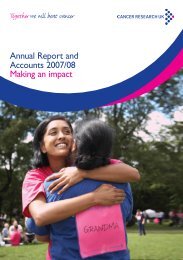
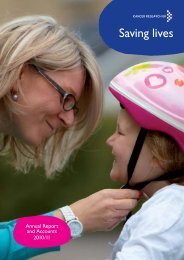
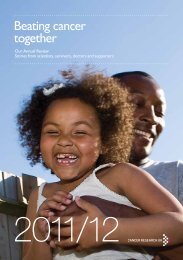
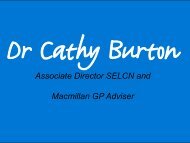
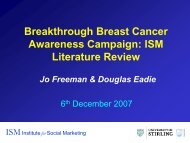
![[PDF] Cancer Research UK's strategy 2009 - 2014](https://img.yumpu.com/29239422/1/184x260/pdf-cancer-research-uks-strategy-2009-2014.jpg?quality=85)
